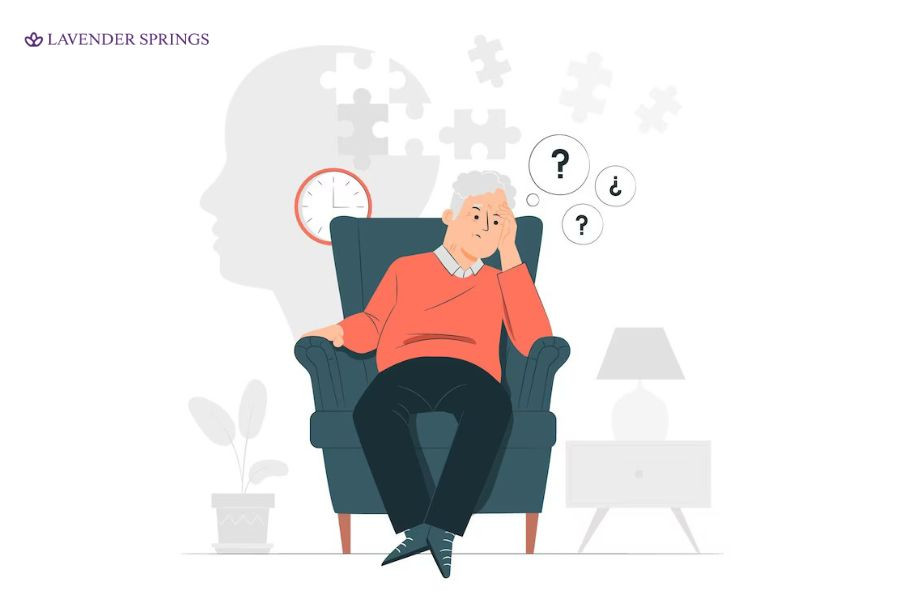Transitioning to Memory Care
Austin, United States - May 31, 2023 / ConversionFormula /
At Lavender Springs Assisted Living, we understand the challenges and emotional decisions involved in transitioning a loved one to memory care. As a leading provider of memory care services, we are committed to supporting families during this important and sensitive time. In this comprehensive guide, we will explore the key signs that indicate it may be time to consider transitioning to memory care. By recognizing these signs and taking proactive steps, you can ensure the safety, well-being, and quality of life of your loved one.
1. Increasing Memory Loss and Forgetfulness
Memory loss and forgetfulness are common symptoms associated with various forms of dementia, including Alzheimer's disease. Notice a significant decline in your loved one's memory, such as forgetting recent events, struggling to recall names, or repeating questions. It may be a strong indicator that memory care is necessary. Our dedicated memory care professionals are trained to provide the specialized support and interventions needed to manage memory-related challenges effectively.
2. Decline in Personal Hygiene and Self-Care
A decline in personal hygiene and self-care can be a red flag that it's time to transition to memory care. Individuals with dementia often struggle with basic activities of daily living, such as bathing, dressing, grooming, and maintaining cleanliness. Our memory care team is experienced in assisting residents with their personal care needs while promoting dignity, independence, and a sense of well-being.
3. Safety Concerns and Wandering Behavior
Wandering behavior is a common occurrence among individuals with memory impairments. If your loved one exhibits a tendency to wander aimlessly, especially in unsafe situations or environments, it becomes crucial to consider memory care. Our secure memory care community provides a safe and nurturing environment that minimizes the risk of wandering, ensuring the safety and security of our residents.
4. Difficulty Managing Medications and Medical Needs
As dementia progresses, individuals may face challenges in managing their medications and medical needs effectively. This can lead to missed doses, incorrect administration, or potential health complications. Our memory care professionals work closely with residents, providing medication management, regular health assessments, and coordination with healthcare providers, ensuring optimal wellness and peace of mind.
5. Social Withdrawal and Isolation
Individuals with dementia often experience social withdrawal and isolation due to cognitive changes and the challenges they face in social settings. Notice your loved one becoming increasingly withdrawn, disinterested in activities they once enjoyed, or exhibiting signs of depression and loneliness. It may be an indication that memory care can offer the social engagement and supportive community they need. Our memory care programs foster meaningful social connections, promote mental stimulation, and provide a sense of belonging.
6. Sundowning and Sleep Disturbances
Sundowning, characterized by increased confusion, restlessness, and agitation in the late afternoon or evening, is a common symptom among individuals with dementia. Sleep disturbances, such as insomnia or nighttime wandering, can also disrupt the overall well-being of both the individual with dementia and their caregivers. Our memory care team is trained to address sundowning and sleep disturbances through personalized care plans, calming activities, and an environment conducive to relaxation and quality sleep.
7. Caregiver Burnout and Stress
Caring for a loved one with dementia can be physically and emotionally demanding, often leading to caregiver burnout and stress. If you find yourself struggling to meet your loved one's needs or experiencing a decline in your own well-being, it may be an indication that transitioning to memory care is necessary. Our memory care services not only support the residents but also provide respite for caregivers, allowing them to recharge and maintain their own health.
8. Nutrition and Mealtime Challenges
Maintaining a healthy and balanced diet is crucial for individuals with dementia, as they may face difficulties in preparing meals or have a diminished appetite. In memory care, we prioritize nutrition by offering specialized meal plans and assistance during mealtimes. Our trained staff ensures that residents receive proper nutrition, catering to their dietary needs and preferences.
9. Decline in Cognitive Abilities and Functioning
Dementia progressively affects cognitive abilities, including problem-solving, decision-making, and reasoning. If you notice a decline in your loved one's cognitive functioning, such as difficulty following conversations, impaired judgment, or an inability to perform familiar tasks, memory care can provide the appropriate interventions and support to help maintain cognitive abilities for as long as possible.
10. Unmanageable Behavioral Changes
Behavioral changes, such as aggression, agitation, or repetitive behaviors, can become increasingly challenging for families to manage independently. Memory care communities are equipped with trained professionals who specialize in dementia care and have the expertise to address and manage these behavioral changes effectively. We strive to enhance emotional well-being and minimize distressing behaviors through tailored approaches, therapeutic activities, and a supportive environment.
11. Specialized Programming and Supportive Environment
Memory care communities offer specialized programming and a supportive environment that is designed to meet the unique needs of individuals with dementia. From memory-enhancing activities to sensory stimulation programs, we create opportunities for engagement, purposeful living, and a sense of accomplishment. Our person-centered approach ensures that each resident receives individualized care and support.
12. Access to 24/7 Care and Emergency Response
In memory care, round-the-clock care and emergency response availability are crucial. Our trained staff is present 24/7 to provide assistance, monitoring, and immediate response to any medical or safety needs that may arise. This ensures that residents receive the prompt and comprehensive care they require, promoting their overall well-being and peace of mind for their families.
13. Enhanced Quality of Life and Overall Well-being
Transitioning to memory care can significantly enhance the quality of life and overall well-being of individuals with dementia. With a focus on personalized care, engaging activities, and a supportive community, our memory care services aim to optimize the physical, emotional, and social aspects of residents' lives. We strive to promote a sense of purpose, independence, and dignity by providing a nurturing and stimulating environment.
Conclusion
Recognizing the signs that it's time to transition to memory care is an important step in ensuring the safety, well-being, and quality of life of your loved one. At Lavender Springs Assisted Living, we provide exceptional memory care services that address the unique needs of individuals with dementia. By choosing our memory care community, you can trust that your loved one will receive the highest level of care, support, and compassion, helping them thrive and find joy in each day.
To explore our exceptional memory care services and provide your loved one with the support they deserve, contact Lavender Springs Assisted Living today at 512-858-0211. Our dedicated team is ready to assist you in making a positive transition to memory care.

Contact Information:
Lavender Springs
13701 Trautwein Rd
Austin, TX 78737
United States
Katie Hamilton
(512) 858-0211
https://lavendersprings.com/
Original Source: https://lavendersprings.com/media-room/#/media-room


